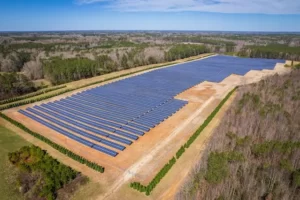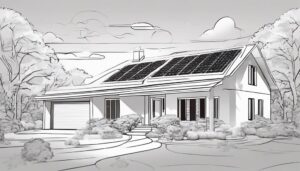
You’ve probably heard that home solar heat systems are a surefire way to unlock massive savings on your energy bills. But before you dive headfirst into the world of solar panels, it’s crucial to fully understand the real costs involved.
From installation expenses to ongoing maintenance and potential savings, the journey to solar energy is more intricate than it may seem at first glance.
So, before you make any decisions, let’s uncover the nitty-gritty details of what it truly takes to harness the power of the sun for your home’s heating needs.
Key Takeaways
- Solar thermal technology offers eco-friendly hot water heating and can lead to long-term savings on hot water heating costs.
- Evaluating property suitability for solar thermal involves considering factors like available sunlight and shading.
- Researching financing options such as tax credits and grants can help reduce upfront installation costs.
- Regular maintenance and proactive care are important for ensuring the efficiency and longevity of solar thermal systems.
Understanding Solar Thermal Technology
When considering solar thermal technology for your home, it’s essential to understand how it harnesses the sun’s energy to provide eco-friendly and sustainable hot water heating. Solar thermal water heaters use flat plate collectors or evacuated tubes to absorb the sun’s radiation, offering an environmentally friendly alternative to traditional water heating systems.
The benefits of this technology include significant long-term savings on hot water heating costs and a reduced carbon footprint. By harnessing renewable energy, solar thermal systems contribute to a cleaner environment and lower reliance on non-renewable resources.
However, it’s important to consider some drawbacks as well. Solar thermal systems may require electric or gas boosters on cloudy or cold days to ensure a consistent hot water supply, potentially adding to the overall cost. Additionally, evaluating your property for solar thermal suitability involves considering factors like available sunlight, shading, and space for water tank installation.
Understanding both the benefits and drawbacks, as well as the environmental impact, will help you make an informed decision about implementing solar thermal technology in your home.
Initial Installation Costs
Considering the initial installation costs of home solar heat systems, it’s important to understand the various factors that can impact the total investment for this eco-friendly technology. When evaluating the initial installation costs, keep in mind the following:
- System Size and Type: The size and type of solar panels you choose will directly impact the initial installation costs. Larger systems or more advanced technology may come with a higher price tag.
- Location: The geographic location of your home can affect installation costs. Factors such as local regulations, accessibility, and sun exposure can influence the overall expenses.
- Financing Options: Research available financing options, such as tax credits, rebates, and grants, which can significantly reduce the upfront costs of installing a solar heat system.
- Installation Timeline: Consider the installation timeline, as it can vary depending on factors like the complexity of the project and the availability of professional installers in your area.
Exploring these factors and understanding financing options can help you make informed decisions about the initial installation costs of home solar heat systems. Be sure to weigh the upfront investment against the long-term benefits and potential energy savings.
Government Incentives and Rebates
Government incentives and rebates can significantly reduce the upfront costs of installing a home solar heat system, making renewable energy more accessible and affordable for homeowners.
Federal and state governments provide robust support for solar investments, offering Small-scale Technology Certificates (STCs) that serve to lower the initial expense. These STCs are tradable commodities, allowing homeowners to claim them as a discount or sell them in the renewable energy market. This not only makes solar system affordability more feasible but also encourages participation in the renewable energy market.
Additionally, certain states offer supplementary financial incentives, further sweetening the deal for those considering solar energy. By taking advantage of these incentives and rebates, homeowners can make a positive impact on the environment while also experiencing long-term financial benefits.
It’s essential to stay informed about the specific incentives and rebates available in your area, as they can significantly impact the overall cost of transitioning to a home solar heat system.
Ongoing Maintenance and Repairs
After taking advantage of government incentives and rebates to make your home solar heat system more affordable, it’s important to understand the ongoing maintenance and repair requirements to ensure its long-term performance. Here’s what you need to know:
- Solar Panel Cleaning: Regular cleaning of solar panels is essential to maintain their efficiency and maximize energy production. Accumulated dirt, dust, or debris can impact the system’s ability to harness sunlight effectively.
- Professional Inspections: Periodic inspections and maintenance by a qualified professional can help identify and address any issues with the solar system. These inspections can catch potential problems early, preventing more significant issues down the line.
- Component Maintenance: Components such as inverters and batteries may require maintenance or replacement over time to ensure the system’s functionality. Keeping these components in good working order is crucial for the overall performance of the system.
- Being Prepared for Repairs: Being prepared for potential repairs and associated costs can help homeowners effectively manage their solar system’s ongoing maintenance. It’s essential to budget for potential repairs and stay proactive in maintaining the system’s integrity.
Understanding and staying on top of these ongoing maintenance needs can help ensure that your home solar heat system continues to operate efficiently and effectively.
Projected Energy Savings
Solar panels can provide substantial energy savings, allowing homeowners to generate electricity from sunlight and reduce their reliance on traditional grid electricity. By harnessing solar power, you can potentially maximize efficiency and reap long-term benefits.
The initial investment in solar panels can lead to significant projected energy savings over time. As solar panels offer a return on investment, they can gradually pay for themselves through reduced energy bills. Moreover, any excess energy generated can be fed back into the grid, earning you credits or even money, further enhancing potential energy savings.
Government incentives and rebates also make solar systems more affordable, providing additional opportunities for energy cost reduction. Ultimately, by leveraging solar energy, homeowners can potentially enjoy virtually free electricity and substantial savings on energy bills.
This not only benefits your finances but also contributes to a more sustainable and environmentally friendly lifestyle. Embracing solar power for your home is a strategic move towards long-term financial savings and reducing your carbon footprint.
Frequently Asked Questions
Does Solar Heating Save Money?
Yes, solar heating does save you money. Solar panel efficiency and energy storage technologies make it a cost-effective choice. You’ll enjoy lower energy bills and potential earnings from excess energy fed back into the grid.
What Is the Australian Government Solar Rebate?
The Australian government solar rebate is a financial incentive to support renewable energy. It provides up to $3,000 for installing solar power systems, promoting environmental benefits. To claim, and meet eligibility criteria, use accredited installers and panels.
How Much Does a 10kW Solar System With Battery Cost?
The cost breakdown includes factors like location, brand, and installation. It’s important to consider quotes from reputable retailers and the installation process.
How Much Will I Save if I Install a Solar Hot Water Heater?
If you install a solar water heater, you can save significantly on energy bills compared to traditional systems. The installation process is relatively straightforward, and over time, the savings comparison makes it a smart investment for your home.
Conclusion
Home solar heat systems offer a promising solution for reducing energy costs and promoting sustainability. Factors like system size, location, and financing options make the investment more affordable. Government incentives and rebates further contribute to the feasibility of transitioning to solar energy.
Ongoing maintenance and repairs are necessary to ensure optimal performance. Projected energy savings and reduced reliance on grid electricity are significant advantages. Investing in solar panels is a strategic move towards financial savings and reducing your carbon footprint.



